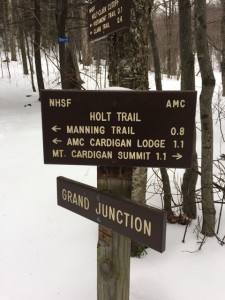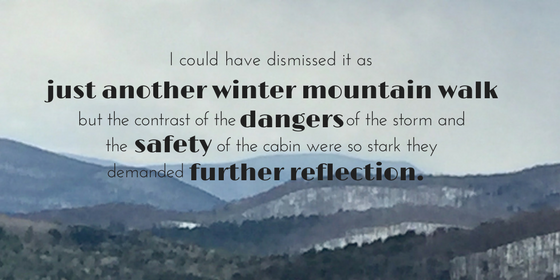Storytelling is our way of bringing meaning to what might otherwise appear to be random events in everyday existence. Stories answer questions. John Eldredge, who I referenced in the Contours of Story, says the great philosophical question is really quite simple: “How did all of this get here?” or to put it in the words of Tolkien’s heroic hobbit: “I wonder what sort of tale we’ve fallen into?”

Signposts on Mt Cardigan, NH 2017
Have you ever wondered what kind of tale you’ve fallen into? Many of us do not think of ourselves as being on a quest to save the world from the dark and evil forces concentrated in the shadow of Mordor. But could we be wrong? It could be that we are more like the characters in Lord of the Rings than we might image. And it could be that our world resembles Middle Earth more than we might think.
And if we are living within the framework of the battle between forces of good and evil, does that change the way we look at the purpose and meaning of our own lives?
When my son Arthur and I departed the Lodge at Cardigan, we thought we were embarking on an easy journey that would take us to an open mountaintop with inspiring views and then, after that, on to a nearby hikers’ cabin to spend a safe and warm winter night.
The Cardigan summit, though, turned into a battleground. We had walked into a turbulent and unpredictable world putting our safety on the line. We had to draw on instinct and experience to find our way down to the cabin. Without saying a word, we both understood the dangers of the world we crossed through and were grateful to arrive at the place that would provide warmth and rest.
I have thought about this experience long and hard since it happened. I could have dismissed it as just another winter mountain walk, but the contrast of the dangers of the storm and the safety of the cabin were so stark they demanded further reflection.

Many years ago, in another time of great personal challenge, I discovered the Bible. Even though I was in my middle years, my understanding of the world was not built on a strong biblical foundation. I had been brought up in a Christian culture, but that world was not a culture of the cross; instead, the church had been transmuted into a diluted remnant of an earlier, more vibrant expression of the faith. The institution of the church was accepted as long as it did not impose itself too severely on the wishes of the people and their communities. This was the world I knew as a boy and young man; you might call it the world of “Cabin Christians” where the safe and pleasant environment of the cabin is substituted for the difficulties of being a Christian in a more turbulent and unpredictable world.
This is what Jesus prayed for those who will follow him after his crucifixion and resurrection: “I have given them your word, and the world has hated them because they are not of the world, just as I am not of the world. I do not ask that you take them out of the world, but that you keep them from the evil one. They are not of the world, just as I am not of the world. Sanctify them in the truth; your word is truth. As you sent me into the world, so I have sent them into the world.”(John 17:14-18)
And in the Sermon on the Mount Jesus says, “Blessed are you when others revile you and persecute you and utter all kinds of evil against you falsely on my account. Rejoice and be glad, for your reward is great in heaven, for so they persecuted the prophets who were before you.”(Matthew 5:11-12)

Shelter on Mt Cardigan, NH 2017
On the summit I longed for the safety of the cabin, but I also knew that we would need to depart the cabin soon enough to go back to the world Jesus describes. Jesus was warning his disciples that they would encounter resistance in this world, but he also promised that he would be with them “always to the end of the age.”(Matthew 28:20)
The truth is this: If we accept the great commission of Jesus Christ to go out into the world to make disciples of all nations, we will experience dangers and discomfort. It may even seem like a hopeless battle at times, but do we have a choice? If we accept the call, then we must accept the conditions that might come with the call. Sam and Frodo did not choose the journey to Mordor for themselves; they knew their whole world was at risk. The seemingly safe Shire was not really safe at all. They did not know it, but these two improbable heroes were part of a much bigger story that transformed a mere journey into an epic mission. The odds at times may seem insurmountable, but the mission commissioned by Jesus Christ is all about overcoming the impossible.



